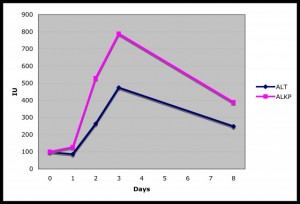About a week has passed since we returned to Raleigh from Philadelphia, where Sasha received her first treatment in the Mason Bone Cancer Study. She is doing extremely well! Take a look at this video:
We took Sasha to our local vet on Wednesday to have blood drawn and sent to Dr. Mason at UPenn. During her stay in Philadelphia, Sasha’s liver enzymes rose to above normal levels. Click here to read about Sasha’s first treatment at UPenn. Dr. Mason was not too concerned about the elevated enzymes, as this reaction to the vaccine was reasonably expected.
Christina, a wonderful veterinary technician at Brentwood Animal Hospital, our local vet’s office, was tasked with drawing Sasha’s blood. She is a bit of a phlebotomy hotshot with a knack for finding good veins quickly. Unfortunately, this time Christina did have some difficulty guiding a syringe into Sasha’s vein. She switched from Sasha’s leg to her arm and quickly found her mark. Sasha was ready to leave after being poked, and Christina had all the blood she needed to send to Dr. Mason.
Sasha’s blood arrived at UPenn the next day. Tests were run, and Dr. Mason let us know that all of Sasha’s numbers looked good. Her red and white blood cells were normal, as were her platelets, and her liver enzymes were falling nicely, too. Dr. Mason even sent us a graph where she plotted Sasha’s liver enzyme values so that we could see the downward trend, visually.
Dr. Mason explained that the probable cause for Christina’s difficulty in finding a good vein to draw blood from in Sasha was that she may have been dehydrated. She said that the sample of blood showed that her proteins were within normal parameters but at the top end of normal. She also said that Sasha’s sodium level was a little high. High blood proteins and high sodium levels are indicators of possible dehydration. Another possibility is that sometimes the vessels where chemotherapy drugs are administered can become damaged, and are difficult to draw blood from.
Dr. Mason told us that the article on the study in the Philadelphia Inquirer brought several more dogs forward, and her team is currently screening their tumors for the Her2/neu expression. There are currently 7 recruits and 3 or 4 being screened. We hope these dogs make it into the study, and that they all do as well as Sasha has done so far! Good luck to all!
